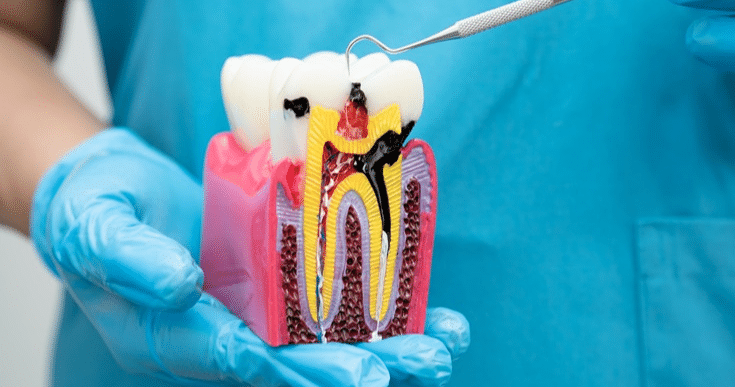
The concept of using antibiotics for root canal infection is a highly controversial topic within the field of dentistry. While some dental professionals argue that antibiotics can be effective in treating infections associated with root canals, others vehemently oppose their use, citing potential risks such as antibiotic resistance and systemic side effects. However, in cases where the infection is severe or has spread beyond the tooth, antibiotics may be necessary to prevent further complications and promote healing.
Patients must consult with their dentist to determine the most appropriate course of action for addressing an infected root canal, weighing the potential benefits against the possible drawbacks of antibiotic therapy. The decision to use antibiotics should not be taken lightly, as it can have far-reaching consequences on both oral health and overall well-being. So, let’s read this blog further to bust the myth of antibiotics as a cure-all.
Root Of The Cause, Myth Busted!
A healthy tooth has a pulp chamber at its core, containing nerves and blood vessels. When bacteria invade this chamber, often due to deep decay or a cracked tooth, an infection ensues. In some instances, antibiotics for root canal are prescribed to help manage and eliminate the bacterial infection, particularly if there are signs of spreading it further. This infection can cause:
- Severe toothache: A throbbing, persistent pain that can radiate to your jaw, ear, or head.
- Sensitivity to hot and cold: The inflamed pulp becomes hypersensitive to temperature changes.
- Swollen gums: The gum tissue surrounding the infected tooth may become red, puffy, and tender.
- Facial swelling: In severe cases, swelling can spread to the face.
The Role of Antibiotics: Temporary Warriors, Not Permanent Champions
Here’s the truth about antibiotics and root canal infections:
- They can help manage symptoms: Using antibiotics for root canal can be prescribed to reduce inflammation caused by the infection and lessen pain temporarily. They work by targeting and killing bacteria throughout the body, including those contributing to the root canal infection.
- They can’t reach the source: Antibiotics circulate through the bloodstream, but they may not effectively penetrate deep into the infected tooth pulp. The bacteria causing the infection are essentially trapped within the canals of the tooth, out of reach for the antibiotics’ full effect.
- They’re not a long-term solution: While antibiotics might offer temporary relief, they don’t address the underlying issue – the infected pulp tissue within the tooth. Leaving the infected pulp untreated allows the infection to persist and potentially worsen.
The Definitive Champion: Root Canal Treatment – A Lasting Solution
The only way to definitively treat a root canal infection is through a root canal procedure. Although, in some cases, our dentists may prefer antibiotics for root canal procedures to combat infection further and promote healing. Here’s what to expect:
- Numbing the area: An anesthetic is used to ensure you don’t feel any pain during the procedure.
- Accessing the Pulp: The dentist creates a small opening in the tooth crown to access the infected pulp chamber.
- Removing the Infection: The dentist carefully removes the infected pulp tissue, including bacteria and inflamed blood vessels.
- Cleaning and Disinfection: We thoroughly clean and disinfect the canals within the tooth to eliminate any remaining bacteria.
- Sealing the Tooth: We fill the canals with a special material to prevent future infection.
- Crowning (Optional): In some cases, our dentists might place a crown on the tooth to provide added protection and strength, depending on the extent of the damage.
Benefits of Root Canal Treatment:
- Pain Relief: Root canal treatment effectively addresses the source of the pain, providing long-term relief. Additionally, our dentists may prescribe antibiotics for root canal treatments to eliminate any remaining infection and ensure complete healing.
- Saves the Tooth: By removing the infection, a root canal procedure helps preserve your natural tooth structure.
- Prevents Future Complications: Left untreated, a root canal infection can lead to serious complications like tooth loss, jawbone infection, and even systemic health problems. Root canal treatment prevents these risks.
Antibiotics – A Helpful Ally, Not the Lone Hero
Antibiotics can help manage root canal infection symptoms but are not a substitute for definitive treatment. A root canal procedure addresses the source of the infection, saving your tooth and preventing future complications.
If you suspect a root canal infection, schedule a consultation with your dentist immediately. Early diagnosis and treatment are crucial for preserving your oral health and regaining your pain-free smile. Remember, proactive dental care is always the best defense against dental problems.
Book Your Smile-Saving Consultation Today!
Don’t let a root canal infection steal your smile’s thunder! If you notice any signs of infection, then schedule a consultation with your dentist today. Many dental practices offer convenient online scheduling options, or you can simply call their office to book an appointment. Take control of your oral health and schedule your smile-saving consultation today. Remember, only a proactive approach can lead to a healthy, pain-free smile.




